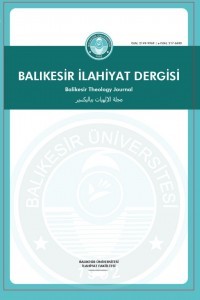İbâziyye Mezhebine Has Abdesti Bozan Durumların Değerlendirilmesi
İslam, Mezhep, İbâziyye mezhebi, Abdest
Evaluation of the Situations that invalidate the Ibâziyye Sect.
Islam, Sect, Ibazıyya Sect, Ablution,
___
- Bisyevî, Ebî Hasan Alî b. Muhammed. Cami’ Ebî’l-Hasan el-Bisyevî, Maskat: Vizâretu’l-Evkâf ve Şûnu’d-Diniyye, 2008.
- Cîtâlî, Ebû Tâhir İsmail b. Musa. Kavâidu’l-İslâm, Umân: Mektebetu’d-Dârimî, 2015.
- Dârekutnî, Ebu Hasan Ali b. Ömer b. Ahmed b. Mehdi b. Mes’ut b. Nu’man b. Dinar. Sünenü Dârekutnî, Beyrut: Muessetu’r-Risâle 2004.
- Ebî Şeybe, Ebu Bekir Abdullah b. Muhammed. İbrahim b. Osman el-Hâvestî el Absî. Musânnâf İbn Ebî Şeybe, Riyad: Mektebetu’r-Rüşd, 1409.
- Ebû Kâsım, Ömer b. Hüseyin b. Abdullah. Metnu’l-Herkî ‘ala Mezhebi Ebi Abdullah Ahmed b. Hanbel eş-Şeybanî, Beyrut:Daru’s-Sahâbe li’t-Turas, 1993.
- el-İzkevî, Muhammed b. Câfer Ebû Câbir. el-Câmi’, Umân: Vizâretu’l-Evkâf ve Şuûnu’d-Diniyye, 2018.
- es-Suneykî, Zekeriyya b. Muhammed b. Ahmed. el-Ğureru’l-Behiyye fi Şerhi Behçetil Verdiyye, Kahire: el-Matba’ el-Meymeniyye, 2001.
- Eş’arî, Ebî Hasan Alî b. İsmail. Makâlâtü’l-İslâmiyyin ve İhtilâfu’l-Musallîn, Beyrut: Dar Sâdir, 2006.
- Ettafeyyiş, Muhammed b. Yusuf. Şerh Kitabu’n-Neyl ve Şifau’l-‘Alil, Cidde: Mektbetu’l-İrşâd, 1972.
- Ğamravi, Muhammed Zehrî. es-Siracu’l-Vehhac, Beyrut: Dâru’l-Kutûbi’l-İlmiyye, 2005.
- Haraşî, Muhammed b. Abdullah. Şerhu Muhtasâr Halil, Beyrut: Dâru’l-Fikr, 1997.
- İbn Hibbân, Muhammed b. Hibbân b. Ahmed b. Hibbân b. Muâz b. Me’bed. el-İhsân fi Takrîb Sahîh İbn Hibbân, Beyrut: Muessetu’r-Risâle, 1988.
- İbn Kûdame, Abdullah b. Ahmed b. Muhammed. el-Mûğnî, Kâhire: Dâru’l-Hadis, 2004.
- İbn Mâceh, Ebû Abdullah Muhammed b. Yezîd. Sünenü İbn Mâceh, Lübnan: Dâru’l-İhyâu’l-Kutûbi’l-Arabiyye. İbn Rüşd el-Kûrtûbî, Ebû’l-Velid Muhammed b. Ahmed. Bidâyetü’l-Müctehid ve Nihâyetül Muktesid, Beyrut: Dâru’l-Fikr, 2003.
- Kâsâni, Alâuddin Ebû Bekir b. Mes’ud. Bedâ’i’u’s-Sanâ’i fi Tertîbi’ş-Şerâi’ Beyrut: Dâru’l-Kutubi’l-İlmiyye, 2010.
- Keyrevânî, Ebû Muhammed Abdullah b. Abdurrahman. Metnu Risâle, (Beyrut: Daru’l-Fikr, 1998.
- Kindî, Muhammed b. İbrâhim. Beyanu’ş-Şer’. Umân: Vizâretu’l-Evkâf ve Şûnu’d-Diniyye, 1983.
- Merğinânî, Ali b. Ebû bekir b. Abdulhalîl. Metnu Bidâyeti’l-Mümtedi, Kâhire:Mektebetu Ali Sebeh, 2001.
- Muhammed b. Abdullah el-Hatîb el-Ömerî, Tebrizî, Mişkatu’l-Mesâbîh, Beyrut: el-Mektebe İslâmiyye, 1985.
- Mustafa Sâlih Bâcû. Menhecu’l-İctihat İnde’l-İbâziyye, Maskat: Mektebetu Cîli’l-Vâ’îd, t.y.
- Nîsâbûrî, Ebû Abdillâh Muhammed b. Abdillah b. Muhammed, Hâkim. el-Müstedrek Âla Sahîheyn, Beyrut: Daru’l-Kutubu’l- İlmiyye, 1990.
- Sâlimî, Abdullah b. Hâmid. Şerhu’l-Câmi’ Sâğir Müsnedü İmam Rebi’, Umân: Mektebetu İmâm Nureddin es-Sâlimî, 2017.
- Sâlimî, Abdullah b. Muhammed b. Abdullah. Mevsûatü’l-Fıkhi-İbâdî, Umân: Vizâretu’l-Evkâf ve Şûnu’d-Diniyye, 2017.
- Sâlimî, Nurettin Abdullah b. Humeyd. Meâricu’l-Âmâl. Umân: Vizâretu’l-Evkâf ve Şuûnu’d-Diniyyet, 2010.
- Sumeynî, Abdulaziz b. Hâc b. İbrahim et-Tacu’l-Manzûm, I, 433-II, 81; Ebû Câbir, el-Câmi’ (Umân: Vizâretu’t-Turâsi’l- Kiyem ve’s-Sekâfe 2009.
- Şâfiî, Muhammed b. İdris. el-Umm, Beyrut: Dâru İbn Hazm, 2011.
- ISSN: 2149-9969
- Yayın Aralığı: Yılda 2 Sayı
- Başlangıç: 2015
- Yayıncı: Balıkesir Üniversitesi
İslâm Hukuku Açısından Boşanma Tazminatı
Nüzhetü’n-nazar Özelinde Sûü’l-hıfz Kavramı
Hadis Kitaplarında Nakledilen Rivayetlere Göre Sâbit b. Kays ve Muhâlea ile Sonuçlanan Evlilikleri
Nâfî‘ Kıraati İle Âsım Kıraati Arasındaki Nahiv Farklılıklarının Tahlil Edilmesi
İbâziyye Mezhebine Has Abdesti Bozan Durumların Değerlendirilmesi
Abulkâdir El-Mağribî’nin ‘Aserâtu’l-Lisân Adlı Eserinde Yer Verdiği Bazı Yaygın Dil Hataları
